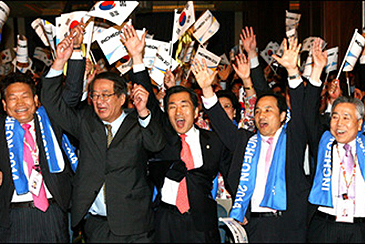The year's worst dust storm plagued much of Korea yesterday, prompting the authorities to issue health warnings against the sandy, chemical-laden wind from China.
Meteorologists are forecasting that this will be the worst ever yellow dust year in terms of severity and frequency due to an unusually warm winter and lighter snowfalls in the desert-like area of northwestern China and Mongolia.
The Korea Meteorological Administration yesterday morning issued yellow dust warnings across the nation for the first time since the nation began monitoring dust particles in 2002.
The warnings were lowered to dust advisories for Seoul, Incheon and Gyeonggi Province as of 5 p.m.
"The yellow dust warnings are likely to remain for some parts until Monday morning," Chang Hyun-sik, a meteorologist at the KMA.
 |
Children wearing masks look out the window at Seoul Tower. Over the weekend, South Korea was blanketed in dust as the worst yellow sandstorms of this year struck the country.
|
A yellow dust advisory is issued when an hourly average dust concentration of over 400 micrograms per cubic meter continues for over an hour. More than 800 micrograms leads to a yellow dust warning.
"Seoul's concentration exceeded 1,124 micrograms per cubic meter, and it's over 1,044 in Sokcho city in Gangwon Province (in the morning)," Chang said.
The Education Ministry instructed local education authorities to consider closing schools or change school times for today if the yellow dust worsens. Elementary schools and kindergartens in some parts of the country, including South Gyeongsang Province, decided to cancel classes for one day.
Amusement parks, mountains and resorts saw their visitors halve as people stayed indoors.
As of yesterday, the murky weather decreased visibility to 3 kilometers in Seoul and 1.5 kilometers in Busan.
The nation is troubled by the seasonal meteorological storms every March through May, as clouds of dust and sand, originating in the deserts of Mongolia and northwestern China, drift eastward across China, South and North Korea and Japan.
The dense clouds usually contain fine, dry soil particles and dioxins, which are toxic chemicals that cause cancer.
The sandstorms are said to be a consequence of China's rapid industrialization.
Over the past 30 years, Korea was affected by yellow dust for an average of 3.6 days per year, but in recent years the number of days has been increasing. Last year, there were four yellow dust alerts lasting a total of 11 days.
"Yesterday was the sixth day of this year already," Chang said. "The dust storm season is expected to last longer than last year."
Meteorologists advised people to refrain from outdoor activities and wear masks when they need to go out. People were also advised to wash their hands and feet more frequently.
Children, the elderly, and people with asthma or heart disease are especially urged to wear a mask when they go outdoors. It also suggested people should see a doctor when they cough for over three weeks without a clear reason.
North Korea's state-run Chosun Central TV also reported on Saturday that thick yellow dust covered the western coast of the country - including Pyongyang, Shinuiju, Nampo and Haeju cities.
Dust storms hit northern China on Saturday, including Beijing, according to news reports. Chinese meteorologists said the mild storm moved toward Mongolia and northern Hebei province.
Last month, top environmental officials from Korea, China and Japan held a conference in Ulsan City and discussed how to cope with the worsening meteorological problem that is peculiar to Northeast Asia. They agreed that farming and pasturing in Mongolia and northern China hastens desertification, and that greater international cooperation is needed to work out measures to reduce the damage caused by the phenomenon.
China has already launched a massive campaign to plant trees around the Gobi Desert in Inner Mongolia to prevent the desertification from spreading further.
Long-term affects from the dust can cause damage to farm products, industrial facilities, cultural property and the overall ecosystem. Experts have long been concerned about the need for the government to come up with effective measures to minimize the damage.





